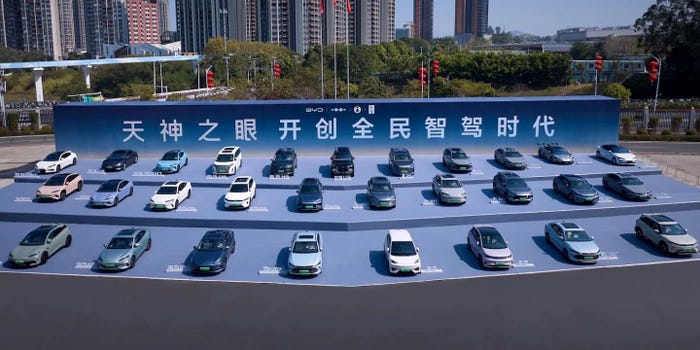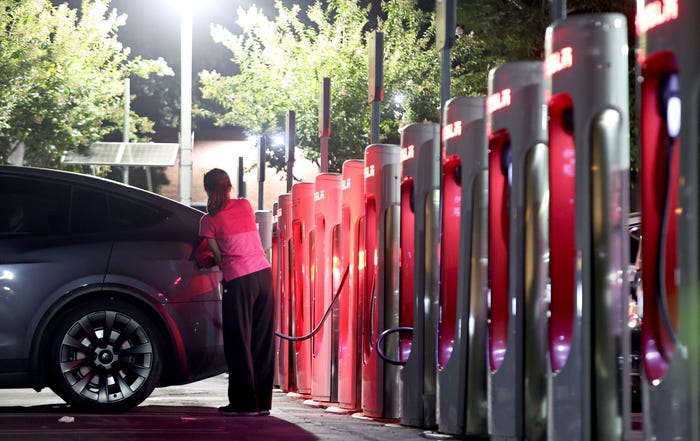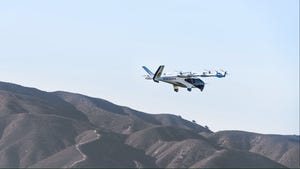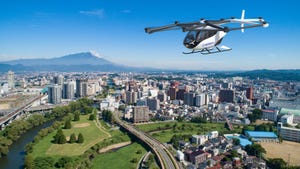Air Taxi Company Releases Teaser Video; Embraer BackedAir Taxi Company Releases Teaser Video; Embraer Backed
The company is also assembling its first full-scale eVTOL working prototype to be used for testing

Electric aerial vehicle (EAV) maker Eve Air Mobility has released a teaser video of its first, full-scale, early prototype vehicle.
Eve, which came out of Embraer’s business and innovation accelerator, has been working to create a low-sound vehicle with efficient thrust.
The company is also assembling its first full-scale eVTOL working prototype to be used for testing.
The EAV is expected to enter service in 2026 and pre-orders have reached nearly 3,000, according to the company.
“We are making great progress on the assembly of our first eVTOL prototype and we are on schedule to complete production and begin flying,” said Johann Bordais, CEO of Eve Air Mobility. “From the beginning, we have been consistent and steadfast taking an holistic approach to Urban Air Mobility by understanding the required ecosystem and infrastructure necessary for eVTOL flights, developing services and operations solutions to support our customers on Day 1 and launching Vector, an innovative air traffic management software solution.”
Eve is leveraging Embraer’s experience of developing, designing and certifying aircraft and it is expected that Eve would use Embraer’s global network of service and support locations.
The Eve eVTOL (electric vertical takeoff and landing) vehicle uses eight propellers for vertical flight and fixed wings to fly on cruise, with no change of component positions for flight, and has a range of 60 miles.
Eve Air recently received an order for up to 50 of its EAVs from the largest helicopter air charter service in Japan.
AirX Inc. signed a letter of intent to purchase 10 EAVs from Eve Air with an option to purchase 40 more and announced the launch of the Greater Tokyo Area’s first eVTOL test field, the Urban Air Mobility (UAM) Center.
In addition to Japan, Eve is working with customers in Australia, India and South Korea.
Eve recently selected Honeywell for navigation, sensors and lighting systems for its flying vehicles.
The EAV maker plans to use Honeywell’s GPS-aided attitude and heading reference systems and inertial reference systems in its eVTOL vehicle.
Those systems aid the pilots while navigating the eVTOL and Eve Air also plans to use Honeywell systems for landing, taxi and anti-collision lighting.
The company plans to use seats from Recaro Aircraft Seating and horizontal and vertical tail, including the rudder and elevator, from FACC.
Eve Air and UrbanX in Miami plan to launch eVTOL commuter flights throughout South Florida by 2026, when the first 10 Eve flying vehicles are expected to be delivered.
GlobalX agreed to purchase 200 flying vehicles from Eve Air in 2022 and established UrbanX as a wholly-owned subsidiary of GlobalX.
The Florida flights are intended to help commuters navigate short distances and avoid traffic congestion and improve travel times.
Road travel times in Miami can be challenging because of delays caused by the frequent opening of numerous draw bridges as boats navigate through the many channels.
The electric flying service in Florida is subject to approvals from the Federal Aviation Administration (FAA) and the Department of Transportation.
Eve Air is growing arrangements with low-cost carriers.
For example, the company teamed with Flynas, a low-cost airline in Saudi Arabia, to explore starting eVTOL services in Riyadh and Jeddah.
Eve Air and Korean airline Jeju Air, the largest low-cost airline in Korea, recently created initial plans for EAV on Jeju Island. South Korea already had been laying the groundwork for urban air mobility.
Eve Air also has been working with cities, countries and regulatory authorities to establish concepts of operations in the U.S., Brazil and U.K.
Eve Air and Hunch Mobility, a joint venture between Hunch Ventures and Blade Air Mobility, already were working together to make Bangalore the launch city for urban air mobility in Bangalore, India.
The Eve Air vehicle is eventually aimed at becoming self-flying.
Eve Air recently signed a deal with DHL Supply Chain to study the supply chain characteristics for Eve’s eVTOL vehicle operations.
Eve’s backlog orders of its EAV totals 2,850 flying vehicles, according to the company.
The company also has created urban air traffic management software with its first eVTOL deliveries. Eve Air has agreements for its four-passenger EAV to fly in numerous countries in addition to Brazil.
Like what you've read? For more stories like this on flying cars and emerging technologies, sign up for our free daily email newsletter to stay updated!
Read more about:
Flying CarsAbout the Author
You May Also Like








